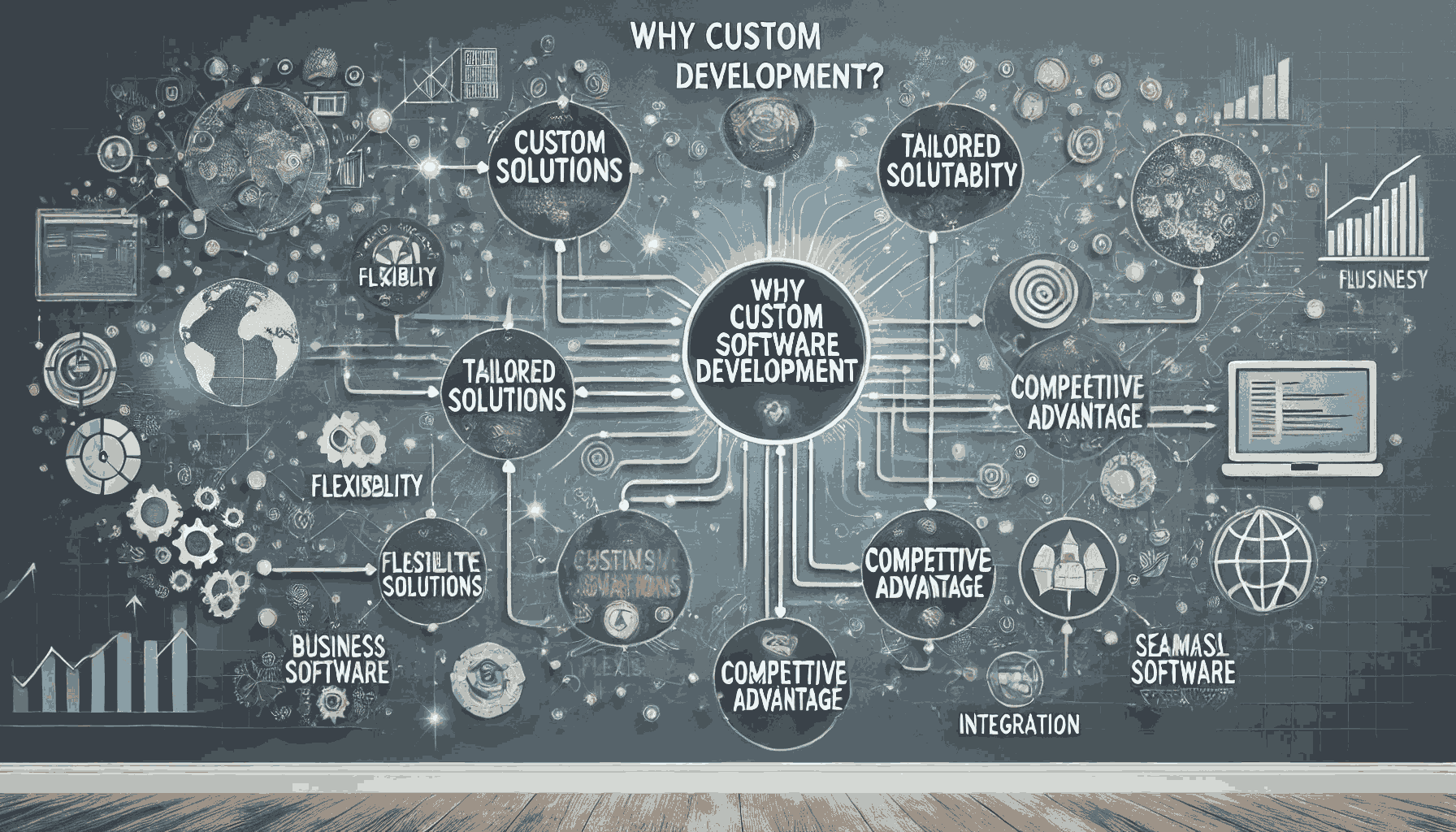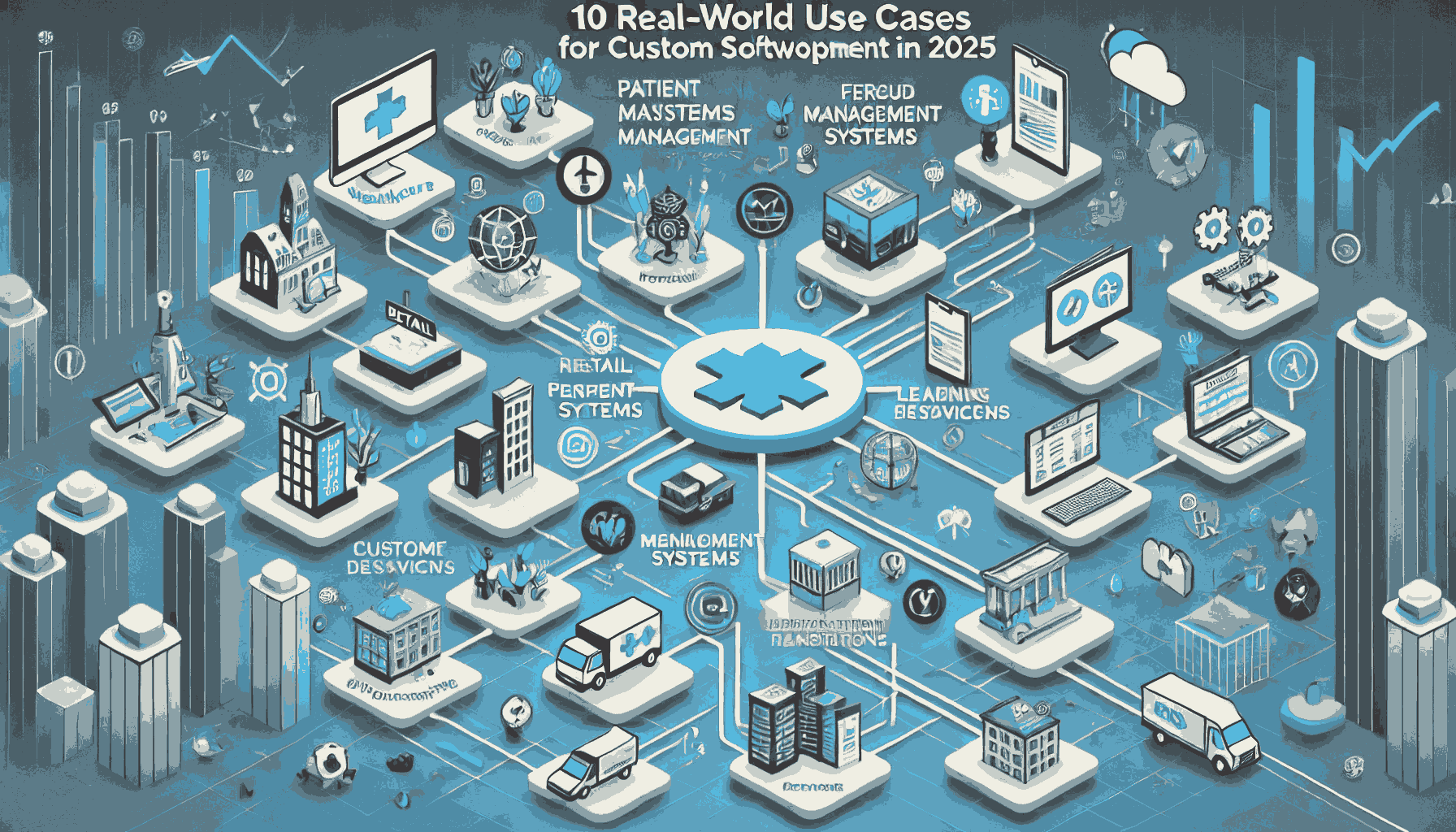Custom software development is transforming the way businesses operate across industries, offering tailored solutions to meet specific needs, streamline processes, and drive innovation. In 2025, companies are increasingly turning to custom software to address complex challenges, improve customer experiences, and remain competitive in a rapidly evolving digital landscape. This blog explores 10 real-world use cases for custom software development and how these solutions are shaping the future of business operations.
Why Custom Software Development?
Before diving into the use cases, it’s essential to understand why businesses are opting for custom software development. Unlike off-the-shelf solutions, custom software is designed specifically to cater to the unique needs of an organization. This ensures:
- Tailored Solutions: Custom software is built to address your business's specific requirements and processes.
- Scalability: As your business grows, custom software can evolve with you, ensuring long-term viability.
- Competitive Advantage: Custom software provides the flexibility to innovate, giving your business an edge over competitors relying on generic tools.
- Integration: It can seamlessly integrate with your existing systems and third-party applications, improving overall efficiency.

10 Real-World Use Cases for Custom Software Development in 2025
1. Healthcare Industry: Patient Management Systems
Custom software is transforming the healthcare sector, particularly in patient management. Healthcare providers are adopting custom Electronic Health Record (EHR) systems that allow them to manage patient data efficiently, streamline appointments, and track medical histories seamlessly.
Example:
A hospital chain might develop a custom patient management system to store and update patient medical records in real-time. The software can integrate with laboratory systems for quick results and offer telemedicine capabilities to serve remote patients.
Benefit: Reduces errors, improves patient care, and enhances overall operational efficiency.
2. Retail: Personalized E-Commerce Platforms
Custom e-commerce platforms are helping retailers create personalized shopping experiences for customers. By using data analytics and AI-powered algorithms, these platforms can recommend products, create targeted promotions, and provide customized services.
Example:
A fashion retailer may develop a custom e-commerce platform that uses customer browsing history and preferences to recommend personalized outfits. The system can also integrate with inventory management to ensure customers can see real-time stock levels.
Benefit: Increases customer engagement, sales conversion, and customer loyalty.
3. Financial Services: Fraud Detection Systems
In the financial services industry, custom fraud detection systems are critical for identifying and preventing fraudulent transactions. These systems can analyze vast amounts of transactional data in real-time to detect anomalies and flag suspicious activities.
Example:
A bank might develop a custom AI-driven fraud detection system that uses machine learning algorithms to assess transaction patterns and immediately alert the bank's fraud department about potential fraudulent activity.
Benefit: Enhances security, reduces losses, and builds customer trust.
4. Manufacturing: Inventory and Supply Chain Management
Custom software solutions are optimizing inventory and supply chain management in manufacturing. These solutions help businesses track product movement, manage inventory levels, and ensure timely procurement.
Example:
A manufacturer of consumer electronics may create a custom software system that integrates with IoT devices to track raw material stock levels, production schedules, and shipments in real-time, allowing for proactive supply chain management.
Benefit: Reduces operational costs, enhances production efficiency, and minimizes delays.
5. Real Estate: Property Management Software
In the real estate industry, custom property management software allows landlords, real estate agents, and property managers to efficiently handle leases, track maintenance requests, and streamline tenant communications.
Example:
A property management company may create a custom system to handle lease agreements, manage tenant payments, and track maintenance requests. This platform could also feature a tenant portal for easy communication and issue resolution.
Benefit: Increases operational efficiency, reduces administrative overhead, and improves customer satisfaction.
6. Education: Learning Management Systems (LMS)
Educational institutions are increasingly adopting custom Learning Management Systems (LMS) to deliver tailored learning experiences. Custom LMS platforms can incorporate unique curricula, provide personalized assessments, and track student performance.
Example:
A university may develop a custom LMS for its online degree programs, enabling instructors to create interactive content, track student progress, and provide real-time feedback tailored to individual learning needs.
Benefit: Enhances the learning experience, improves student engagement, and streamlines administrative tasks.
7. Logistics and Transportation: Fleet Management Software
Custom fleet management software enables logistics companies to optimize their vehicle fleets, improve route planning, monitor driver performance, and track shipments in real-time.
Example:
A logistics company might develop custom fleet management software that uses GPS and real-time traffic data to suggest the best delivery routes, while also monitoring fuel usage, maintenance schedules, and driver behavior.
Benefit: Reduces operational costs, improves delivery times, and enhances customer satisfaction.
8. Hospitality: Reservation and Booking Systems
Custom software in the hospitality industry allows businesses to create reservation systems that integrate with booking platforms, manage guest information, and offer personalized services.
Example:
A hotel chain might develop a custom reservation system that integrates with its website and third-party booking platforms. The system could store guest preferences, allowing the hotel to offer personalized services such as room upgrades or tailored dining experiences.
Benefit: Streamlines operations, enhances the guest experience, and boosts customer loyalty.
9. Entertainment: Media Streaming Platforms
Custom media streaming platforms allow content creators to offer unique experiences to their audiences. These platforms can include features like user-generated content, personalized recommendations, and real-time analytics.
Example:
A video streaming service might build a custom platform that provides users with personalized content recommendations based on their viewing habits, integrates social features for sharing content, and uses real-time analytics to track performance.
Benefit: Increases user engagement, enhances the content discovery experience, and enables data-driven decisions.
10. Customer Service: Chatbots and AI-Powered Support
Custom AI-driven chatbots and support systems are enhancing customer service operations. These systems provide instant responses to customer inquiries, help resolve common issues, and improve the overall customer experience.
Example:
An e-commerce company could create a custom AI chatbot that assists customers with order tracking, product recommendations, and troubleshooting. The chatbot could be integrated with the company’s CRM system for seamless customer interaction.
Benefit: Reduces customer service costs, improves response times, and enhances customer satisfaction.

Case Study: Custom Software in the Healthcare Industry
- Company: HealthTech Solutions
- Industry: Healthcare
- Project: Custom EHR System for a Healthcare Provider
Background:
HealthTech Solutions developed a custom Electronic Health Record (EHR) system for a mid-sized healthcare provider looking to improve patient management, reduce errors, and enhance data accessibility. The healthcare provider was facing challenges with the existing off-the-shelf EHR system, which lacked integration capabilities and was not tailored to their specific needs.
Solution:
HealthTech Solutions developed a custom EHR system that integrated with existing laboratory systems, included real-time patient data updates, and offered telemedicine capabilities. The system also allowed for easy customization based on different departments and patient needs.
Outcome:
- Reduced patient data entry errors by 30%.
- Improved operational efficiency, reducing administrative overhead by 25%.
- Enhanced patient care with easy access to real-time medical records, resulting in higher patient satisfaction.
Conclusion
As businesses continue to evolve in the digital age, custom software development remains a crucial strategy for tackling industry-specific challenges. From healthcare to retail, logistics to education, the use cases for custom software are vast and varied. By adopting tailored solutions, businesses can optimize their operations, enhance customer experiences, and maintain a competitive edge in their respective markets.
In 2025, custom software development will continue to be a cornerstone of business success. Companies that embrace these solutions will not only survive but thrive in an increasingly digital world.
FAQs
Custom software is designed to meet specific business needs, ensuring it offers greater flexibility, scalability, and integration with existing systems. It helps businesses avoid the limitations of off-the-shelf solutions and provides a tailored user experience.
The timeline for developing custom software depends on the complexity and scope of the project. Simple applications might take a few months, while more complex systems can take a year or more to develop.
While custom software can be more expensive upfront, it often offers better long-term value due to its ability to scale, integrate seamlessly with existing systems, and cater to the specific needs of the business. It can save money in the long run by improving efficiency and reducing reliance on external software.
Yes, custom software can be designed to integrate with existing business systems, such as CRM, ERP, or inventory management tools. This ensures smooth data flow across the organization and minimizes disruptions during implementation.





